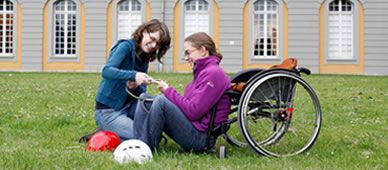Project Goals
I. Tandem-Oriented Goals
The individual long-term support through the co-mentors can help the students to:
- Focus on their personal and academic strengths and expand their potential in a targeted fashion
- Experience themselves in an active and creative role
- Cope with career and personal obstacles self-confidently
- Increase their autonomy and emancipation
II. Life Planning
The individual long-term support through the co-mentors can help the students to:
- Develop their own perspective and expectations
- Handle the limitations and breaks they encounter during their life
- Appreciate and utilization of diversity
- Receive orientation support
- Become acquainted with different role models
- Boost their self-assertiveness and improve their self-organization skills
- Become competent in conflict resolution
- Develop their own views of what constitutes personal success
- Find solutions to problems and challenges that express their own wishes and needs
III. Study and Professional Planning
The individual long-term support through the co-mentor can help the students (to):
- Identify and plan the (future) focus of their academic studies
- Implement realistic time management and planning
- Identify the professional career they want to pursue and become acquainted with other professional environments (i.e. via internships etc, where possible)
- Establish networks both with their peers, the group of co-mentors and other project participants
IV. Socio-Political Goals
In the mid-term, the project will hopefully generate impulses on the socio-political level such as:
- Improved conditions for female academics both in the academia and the job markets
- Testing of a new, exemplary programme model for inclusive career support for women;
- Development of a set of recommended actions for the tertiary education sector in respect to gender-specific inclusion
- Practical implementation of the right to access to education stipulated in the UN Convention on the Rights of Persons with Disabilities
Why Co-Mentors also profit
Mentoring is designed to be a mutually beneficial relationship
...both personally and professionally. That means: it shouldn't be rewarding for the mentee as well as the co-mentor. Here's an overview of the opportunities being a mentor may provide:
- A critical examination of their own life/career and their present professional circumstances
- An active function in the promotion of highly motivated young academics
- Insights into the individual situation and career-oriented decission-making processes of junior scientists
- Feedback in respect to their own counselling style and development/refinement of counselling skills
- Enhanced leadership and social competencies
- Interdisciplinary, inter-generational and inter-university networking
- The satisfying chance to pass on one's own experiences outside the family or job context
The program "CompetenceTandems", will also become a platform dedicated to the discussion and development of recommendations for gender-specific inclusion in the educational sector, science and research. If you are interested in these issue, becoming a mentor may be worthwhile only for this reason.


